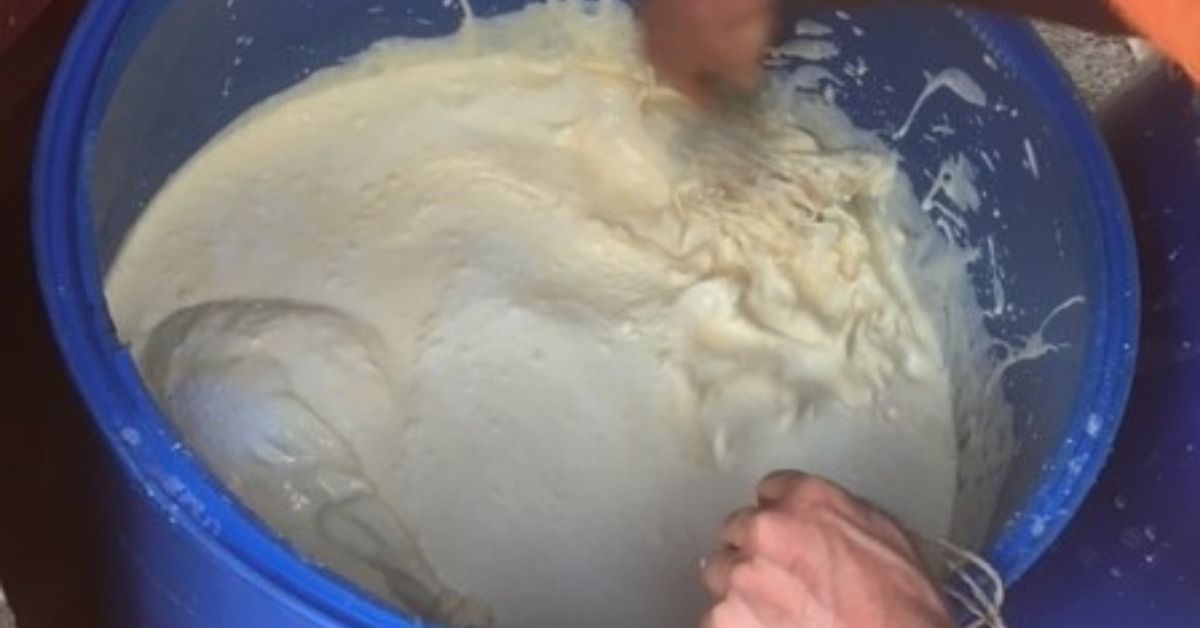WHAg Farmers get Fervent about Ferments!

There can’t be many farmers who haven’t heard about the soil biome, but did you know that many farmers are starting to use fermented foods to keep their livestock’s gut biome healthy? In fact, the use of ‘good bugs’ or beneficial bacteria is a growing trend for many forward thinking farmers.
Jane Dobson runs Broadstone Rare Breeds on the edge of the Preseli National Park, and knows all about the power of micro-bugs for herself and her livestock. She produces her own, easy to make, Kombucha which is a fermentation of black or green tea. Having improved her own health and well-being by sipping small doses each day, she decided to try it on her sheep – “just a small glug in their water for 10 days every month.” Jane noticed that the lambs were much cleaner around their back ends, making fly-strike less of a threat, and discovered ovine worms were greatly reduced despite 6 weeks of warm, wet weather.
“I’m sure the sheep feel really well – It’s really made a difference to the lambs.”

Swearing by ACV
Organic apple cider vinegar or ACV is another fermented food that many farmers swear by. Pammy Riggs has used it for years to keep her commercial poultry healthy (alongside other things like live yoghurt and garlic) adding a ‘generous glug’ to their drinking water – (NB NEVER use it in zinc/metal containers as the acid will react with the metal).
ACV has a reputation as a natural wormer and there is some interesting research showing that it can guard against coccidiosis. Researchers in 2018 did a study with 450 broilers, dividing them into 3 groups; the ACV group showed no signs of Cocci, while the conventionally treated group and the no-treatment control group both suffered clinical symptoms.
Read the full paper: https://pubmed.ncbi.nlm.nih.gov/30450876/

From beneficial bacteria to Bokashi
Dairy farmer Sally Wood from So Good Organic, has become a huge fan of kefir, aka fermented milk. Sally began feeding kefir to her calves in 2019, saw a very good effect, and believes that it gives her herd the best possible start. Kefir is a beneficial bacteria and yeast which Sally explains protects the calves’ gut by populating it with beneficial bacteria. Studies show that the probiotic unique to kefir ‘Lactobacillus kefiri’ can inhibit the growth of various harmful bacteria, including Salmonella and E.Coli. Sally’s step-by-step course on how to produce and feed kefir for your livestock will be available soon on our new learning platform, so stay tuned . . .
Sally has also become fascinated by Bokashi, a method of turning kitchen waste into fermented compost which she uses in her polytunnel and kitchen garden.


KNF 'rocket fuel '
Irish farmer Thomas Stack has gone even further, embracing a method that he claims is like ‘pouring rocket fuel’ on his land in the form of fermented liquid ‘tea’. Having trained in Korean Natural Farming in 2018 he has returned his 60 head of dairy cows to 100% grass fed, and has grass to spare. “KNF is a bio organic farming method which really focuses on what are called indigenous microorganisms (IMOs) – namely bacteria, fungi, nematodes and protozoa. The fermented IMO solution is then sprayed onto the land to good effect .
Thomas says “I know why I’m farming and why I’m doing this – we’re not thinking in cycles; but in generations.”
Read more about KNF and Thomas’ experiences: www.knfdairy.com

If you have personal experience of using fermented foods or beneficial micro-organisms, we’d love to hear from you.
Email: secretary@wholehealthag.org

About the author: The WHAg team love to showcase farmers and supporters who epitomise the ethos of ‘Whole Health’. We live and breathe this approach, which flows through us in farming, work, and family.
